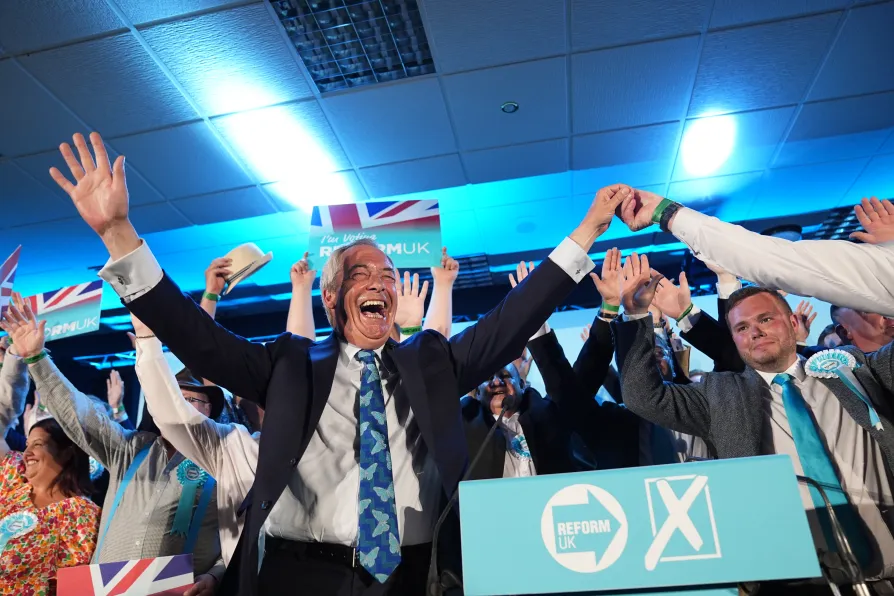
 Reform UK party leader Nigel Farage with his party's candidates onstage during a campaign event at Stafford Showground, Stafford, whilst campaigning for this week's local elections, April 30, 2025
Reform UK party leader Nigel Farage with his party's candidates onstage during a campaign event at Stafford Showground, Stafford, whilst campaigning for this week's local elections, April 30, 2025
REFORM’S victory in the Runcorn & Helsby by-election, as well as its formidable performance in council and mayoral contests, shows the momentum in British politics remains with the hard right.
It is, as National Education Union leader Daniel Kebede points out, cold comfort to point to how narrow its lead over Labour was in Runcorn, when that lead involved overturning a 15,000-strong Labour majority secured less than a year ago.
Nor should Labour point to the dire performance of the Conservatives as cause for relief.
For one thing, Tory losses appear more dramatic than Labour’s because they held more of the council seats being contested. Both parties’ votes plunged on the last time round, and early analysis suggested both on course to lose more than half the seats they were defending.
For another, Labour and the Tories are losing votes for the same reason. Both are identified with a discredited and distrusted political Establishment.
Keir Starmer’s transformation of the Labour Party into one almost indistinguishable from the Tories on austerity, war or laissez-faire economics, at a time of grotesque inequality and industrial decline, was unpopular enough at the general election, when he managed to lose votes on Labour’s dismal 2019 result.
Nine months in office, characterised by the betrayal of workers at Port Talbot and Grangemouth, attacks on pensioners and disabled people and a stubborn refusal to address funding crises across public services and local government, have confirmed voters’ worst suspicions.
Labour is hanging on in some areas, but Reform came a very close second in the North Tyneside, Doncaster and West of England elections, while in the last the closeness of the top three — Labour, Reform and the Greens — show the traditional parties are haemorrhaging votes in both directions, making future results highly unpredictable.
If the Labour and Tory votes are collapsing for the same reason, then Starmer’s apparent determination to keep chasing Conservative voters will bring ever-diminishing rewards.
He was at it in the run-up to Thursday’s votes, asking whether Tories were happy with Reform’s allegedly pro-Russia foreign policy. Yet “vote Labour to prolong war in Ukraine” is not the vote-winner it might seem inside the Westminster bubble.
Meanwhile his government remains toxic on by far the most salient foreign policy issue in British politics, as demonstrated by the general election and the continuing mass demonstrations — its complicity in Israel’s genocidal war against the Palestinians. As for Labour’s other main tactic in the elections — trumpeting its hostility to immigrants as equal to Reform’s — it has been a disastrous failure, as Labour MP Diane Abbott points out.
It would be irresponsibly complacent to put this down to mid-term (in Labour’s first year in office!) blues. Or to assume that British politics, afflicted by the same instability rocking the whole Western world and for the same reason, the ruling class’s commitment to a universally resented economic model, will revert to the two-party paradigm we are used to.
Anti-racists and trade unionists mobilised against Reform, but it is advancing nonetheless.
These interventions may well have saved Labour some mayoralties and slowed the rightward march. And exposing Reform’s hypocrisy, racism and fundamental commitment to the same unjust system as the Establishment parties continues to be important work.
But we are seeing that, on its own, it is not enough. People need something to vote for, not just something to vote against.
Reform or similar outfits will continue to profit from anger at the way things are until the labour movement is a more convincing channel for that anger. To defeat the far right, we cannot be making apologies for Starmer’s Labour: we have to be fighting it harder than they are on every anti-working class policy it unleashes on our people.

With Reform UK surging and Labour determined not to offer anything different from the status quo, a clear opportunity opens for the left, argues CLAUDIA WEBBE

JOE GILL looks at research on the reasons people voted as they did last week and concludes Labour is finished unless it ditches Starmer and changes course












